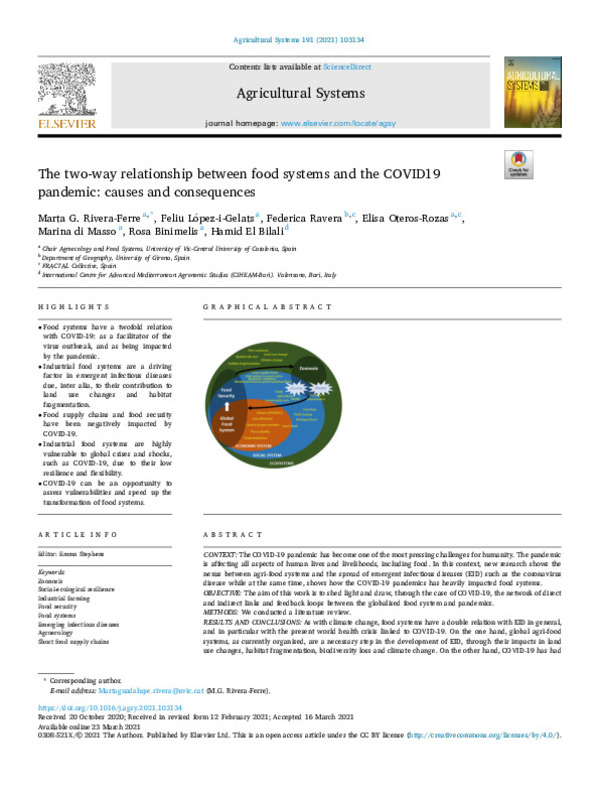JavaScript is disabled for your browser. Some features of this site may not work without it.
Buscar en RiuNet
Listar
Mi cuenta
Estadísticas
Ayuda RiuNet
Admin. UPV
The two-way relationship between food systems and the COVID19 pandemic: causes and consequences
Mostrar el registro sencillo del ítem
Ficheros en el ítem
| dc.contributor.author | Rivera-Ferre, Marta Guadalupe
|
es_ES |
| dc.contributor.author | Lopez-i-Gelats, Feliu
|
es_ES |
| dc.contributor.author | Ravera, Federica
|
es_ES |
| dc.contributor.author | Oteros-Rozas, Elisa
|
es_ES |
| dc.contributor.author | Di Masso, Marina
|
es_ES |
| dc.contributor.author | Binimelis, Rosa
|
es_ES |
| dc.contributor.author | El Bilali, Hamid
|
es_ES |
| dc.date.accessioned | 2024-04-11T08:00:36Z | |
| dc.date.available | 2024-04-11T08:00:36Z | |
| dc.date.issued | 2021-06 | es_ES |
| dc.identifier.issn | 0308-521X | es_ES |
| dc.identifier.uri | http://hdl.handle.net/10251/203338 | |
| dc.description.abstract | [EN] CONTEXT: The COVID-19 pandemic has become one of the most pressing challenges for humanity. The pandemic is affecting all aspects of human lives and livelihoods, including food. In this context, new research shows the nexus between agri-food systems and the spread of emergent infectious diseases (EID) such as the coronavirus disease while at the same time, shows how the COVID-19 pandemics has heavily impacted food systems. OBJECTIVE: The aim of this work is to shed light and draw, through the case of COVID-19, the network of direct and indirect links and feedback loops between the globalised food system and pandemics. METHODS: We conducted a literature review. RESULTS AND CONCLUSIONS: As with climate change, food systems have a double relation with EID in general, and in particular with the present world health crisis linked to COVID-19. On the one hand, global agri-food systems, as currently organised, are a necessary step in the development of EID, through their impacts in land use changes, habitat fragmentation, biodiversity loss and climate change. On the other hand, COVID-19 has had and is having impacts on all food systems at all scales. The review shows that all activities of the food system (from production to consumption) as well as all pillars of food security (availability, access, use, stability) have been affected. The impacts of COVID-19 pandemic on food systems can be divided between direct impacts of the virus outbreak, and indirect impacts derived from the containment measures (e.g. lockdowns, mobility restrictions, shops closure) adopted at different levels (from local to global). While all food systems across the globe have been affected by the pandemic, it is argued that vulnerability is different for different types of food systems. Long food supply chains have been particularly affected by COVID-19 crisis, however, it is important to avoid universalization of impacts and responses as agri-food systems are characterised by a huge diversity and heterogeneity. The review concludes by pointing out that while the pandemic represents a challenge for the global food systems, this 'stress test' can be also seized as an opportunity to highlight vulnerabilities to be urgently addressed during the recovery period and speed up the transformation towards more sustainable and resilient food systems. SIGNIFICANCE: A food systems approach is essential to have a broader picture of the relationship of agri-food systems with zoonosis and their centrality in the pandemics and the derived socio-economic consequences. | es_ES |
| dc.description.sponsorship | Elisa OterosRozas was funded by the Spanish Ministry of Science, Innovation and Universities (IJCI201734334) . Marina di Masso was funded by the Spanish Ministry of Science, Innovation and Universities (IJCI-2016-30769) Federica Ravera was funded by the Spanish Ministry of Science, Innovation and Universities (RYC2018025958I) . | es_ES |
| dc.language | Inglés | es_ES |
| dc.publisher | Elsevier | es_ES |
| dc.relation.ispartof | Agricultural Systems | es_ES |
| dc.rights | Reconocimiento (by) | es_ES |
| dc.subject | Zoonosis | es_ES |
| dc.subject | Social-ecological resilience | es_ES |
| dc.subject | Industrial farming | es_ES |
| dc.subject | Food security | es_ES |
| dc.subject | Food systems | es_ES |
| dc.subject | Emerging infectious diseases | es_ES |
| dc.subject | Agroecology | es_ES |
| dc.subject | Short food supply chains | es_ES |
| dc.title | The two-way relationship between food systems and the COVID19 pandemic: causes and consequences | es_ES |
| dc.type | Artículo | es_ES |
| dc.identifier.doi | 10.1016/j.agsy.2021.103134 | es_ES |
| dc.relation.projectID | info:eu-repo/grantAgreement/MCIU//IJCI-2017-34334/ | es_ES |
| dc.relation.projectID | info:eu-repo/grantAgreement/MCIU//RYC-2018-025958-I/ | es_ES |
| dc.relation.projectID | info:eu-repo/grantAgreement/MCIU//IJCI-2016-30769/ | es_ES |
| dc.rights.accessRights | Abierto | es_ES |
| dc.description.bibliographicCitation | Rivera-Ferre, MG.; Lopez-I-Gelats, F.; Ravera, F.; Oteros-Rozas, E.; Di Masso, M.; Binimelis, R.; El Bilali, H. (2021). The two-way relationship between food systems and the COVID19 pandemic: causes and consequences. Agricultural Systems. 191. https://doi.org/10.1016/j.agsy.2021.103134 | es_ES |
| dc.description.accrualMethod | S | es_ES |
| dc.relation.publisherversion | https://doi.org/10.1016/j.agsy.2021.103134 | es_ES |
| dc.type.version | info:eu-repo/semantics/publishedVersion | es_ES |
| dc.description.volume | 191 | es_ES |
| dc.relation.pasarela | S\461778 | es_ES |
| dc.contributor.funder | Ministerio de Ciencia, Innovación y Universidades | es_ES |








